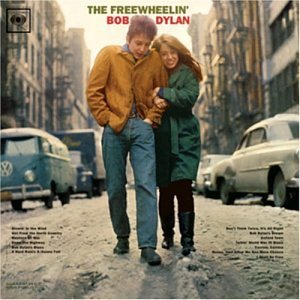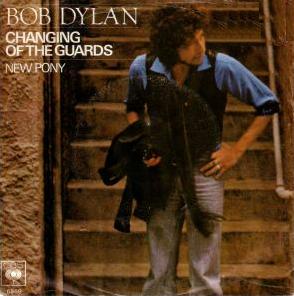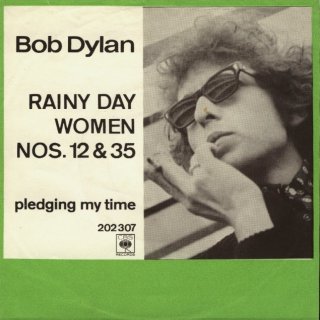
Highway 61 Revisited is the sixth studio album by the American singer-songwriter Bob Dylan, released on August 30, 1965, by Columbia Records. Dylan continued the musical approach of his previous album Bringing It All Back Home (1965), using rock musicians as his backing band on every track of the album in a further departure from his primarily acoustic folk sound, except for the closing track, the 11-minute ballad "Desolation Row". Critics have focused on the innovative way Dylan combined driving, blues-based music with the subtlety of poetry to create songs that captured the political and cultural climate of contemporary America. Author Michael Gray argued that, in an important sense, the 1960s "started" with this album.

Blonde on Blonde is the seventh studio album by the American singer-songwriter Bob Dylan, released as a double album on June 20, 1966, by Columbia Records. Recording sessions began in New York in October 1965 with numerous backing musicians, including members of Dylan's live backing band, the Hawks. Though sessions continued until January 1966, they yielded only one track that made it onto the final album—"One of Us Must Know ". At producer Bob Johnston's suggestion, Dylan, keyboardist Al Kooper, and guitarist Robbie Robertson moved to the CBS studios in Nashville, Tennessee. These sessions, augmented by some of Nashville's top session musicians, were more fruitful, and in February and March all the remaining songs for the album were recorded.

The Freewheelin' Bob Dylan is the second studio album by the American singer-songwriter Bob Dylan, released on May 27, 1963, by Columbia Records. Whereas his self-titled debut album Bob Dylan had contained only two original songs, this album represented the beginning of Dylan's writing contemporary lyrics to traditional melodies. Eleven of the thirteen songs on the album are Dylan's original compositions. It opens with "Blowin' in the Wind", which became an anthem of the 1960s, and an international hit for folk trio Peter, Paul and Mary soon after the release of the album. The album featured several other songs which came to be regarded as among Dylan's best compositions and classics of the 1960s folk scene: "Girl from the North Country", "Masters of War", "A Hard Rain's a-Gonna Fall" and "Don't Think Twice, It's All Right".

"All Along the Watchtower" is a song by American singer-songwriter Bob Dylan from his eighth studio album, John Wesley Harding (1967). The song was written by Dylan and produced by Bob Johnston. The song's lyrics, which in its original version contain twelve lines, feature a conversation between a joker and a thief. The song has been subject to various interpretations; some reviewers have noted that it echoes lines in the Book of Isaiah, Chapter 21, verses 5–9. Dylan has released several different live performances, and versions of the song are included on some of his subsequent greatest hits compilations.

The Times They Are a-Changin' is the third studio album by the American singer-songwriter Bob Dylan. It was released on February 10, 1964, through Columbia Records. Whereas his previous albums, Bob Dylan (1962) and The Freewheelin' Bob Dylan (1963), combined original material and cover songs, this was the first to feature only original compositions. The album consists mostly of stark, sparsely arranged ballads concerning issues such as racism, poverty, and social change. The title track is one of Dylan's most famous; many feel that it captures the spirit of social and political upheaval that characterized the 1960s.

Time Out of Mind is the thirtieth studio album by American singer-songwriter Bob Dylan, released on September 30, 1997, through Columbia Records. It was released as a single CD as well as a double studio album on vinyl, his first since The Basement Tapes in 1975.

"Like a Rolling Stone" is a song by the American singer-songwriter Bob Dylan, released on July 20, 1965, by Columbia Records. Its confrontational lyrics originated in an extended piece of verse Dylan wrote in June 1965, when he returned exhausted from a grueling tour of England. Dylan distilled this draft into four verses and a chorus. "Like a Rolling Stone" was recorded a few weeks later as part of the sessions for the forthcoming album Highway 61 Revisited as its opening track.
Victoria Regina Spivey, sometimes known as Queen Victoria, was an American blues singer, songwriter, and record company founder. During a recording career that spanned 40 years, from 1926 to the mid-1960s, she worked with Louis Armstrong, King Oliver, Clarence Williams, Luis Russell, Lonnie Johnson, and Bob Dylan. She also performed in vaudeville and clubs, sometimes with her sister Addie "Sweet Peas" Spivey, also known as the Za Zu Girl. Among her compositions are "Black Snake Blues" (1926), "Dope Head Blues" (1927), and "Organ Grinder Blues" (1928). In 1961, she co-founded Spivey Records with one of her husbands, Len Kunstadt.
"Tombstone Blues" is a song by American singer-songwriter Bob Dylan, which was released as the second track on his sixth studio album Highway 61 Revisited (1965). The song was written by Dylan, and produced by Bob Johnston. Critical interpretations of the song have suggested that the song references the Vietnam War and US President Lyndon Baines Johnson.

"Just Like Tom Thumb's Blues" is a song written and performed by Bob Dylan. It was originally recorded on August 2, 1965, and released on the album Highway 61 Revisited. The song was later released on the compilation album Bob Dylan's Greatest Hits Vol. II and as two separate live versions recorded at concerts in 1966: the first of which appeared on the B-side of Dylan's "I Want You" single, with the second being released on The Bootleg Series Vol. 4: Bob Dylan Live 1966, The "Royal Albert Hall" Concert. The song has been covered by many artists, including Gordon Lightfoot, Cat Power, Nina Simone, Barry McGuire, Judy Collins, Frankie Miller, Linda Ronstadt, the Grateful Dead, Neil Young, The Black Crowes, Townes Van Zandt, Bryan Ferry, and The Handsome Family. Lightfoot's version was recorded only weeks after Dylan's original had been released and reached #3 on the Canadian RPM singles chart.
"Black Crow Blues" is a song written by Bob Dylan, released on his 1964 album Another Side of Bob Dylan.

"Changing of the Guards" is a song written by Bob Dylan, released in 1978 as a single and as the first track on his album Street-Legal. As a single it failed to reach the Billboard Top 100. However, the song has been included on compilation albums: Bob Dylan's Greatest Hits Volume 3, released in 1994, and the Deluxe Edition of Dylan, released in 2007.

Bob Dylan is an American singer-songwriter. Considered one of the greatest songwriters of all time, Dylan has been a major figure in popular culture over his 60-year career. With an estimated figure of more than 125 million records sold worldwide, he is one of the best-selling musicians of all-time. Dylan added increasingly sophisticated lyrical techniques to the folk music of the early 1960s, infusing it "with the intellectualism of classic literature and poetry". His lyrics incorporated political, social and philosophical influences, defying pop music conventions and appealing to the burgeoning counterculture.

"Pledging My Time" is a blues song by the American singer-songwriter Bob Dylan from his seventh studio album, Blonde on Blonde (1966). The song, written by Dylan and produced by Bob Johnston, was recorded on March 8, 1966 in Nashville, Tennessee. Dylan is featured on lead vocals, harmonica, and guitar, backed by guitarist Robbie Robertson and an ensemble of veteran Nashville session men.
Michael Gray is a British author who has written extensively about Bob Dylan and popular music.

Dennis Edward Freeman was an American Texas and electric blues guitarist. Although he is primarily known as a guitar player, Freeman also played piano and electronic organ, both in concert and on various recordings. He worked with Stevie Ray Vaughan, Jimmie Vaughan, Bob Dylan, Angela Strehli, Lou Ann Barton, James Cotton, Taj Mahal, Barry Goldberg and Percy Sledge amongst others.
Gil Turner was an American folk singer-songwriter, magazine editor, Shakespearean actor, political activist, and for a time, a lay Baptist preacher. Turner was a prominent figure in the Greenwich Village scene of the early 1960s, where he was master of ceremonies at New York City's leading folk music venue, Gerde's Folk City, as well as co-editor of the protest song magazine Broadside. He also wrote for Sing Out!, the quarterly folk music journal.
"Talkin' Bear Mountain Picnic Massacre Blues" is a song by American singer-songwriter Bob Dylan. It was written by Dylan in June 1961, and recorded on April 25, 1962, at Studio A, Columbia Recording Studios, New York, produced by John Hammond. It is a humorous talking blues, which Dylan wrote after Noel Stookey gave him a press clipping about how the sale of forged tickets for a Father's Day picnic trip to Bear Mountain State Park had led to overcrowding and injuries.
"I Shall Be Free" is a song by American singer-songwriter Bob Dylan. It was recorded on 6 December 1962 at Studio A, Columbia Recording Studios, New York, produced by John Hammond. The song was released as the closing track on The Freewheelin' Bob Dylan on 27 May 1963, and has been viewed as a comedic counterpoint to the album's more serious material. Dylan has never performed the song in concert.
"Highway 51 Blues" was the title of a song composed by American blues pianist Curtis Jones, released on a 78 record on January 12, 1938, which was popular enough to spawn several covers and offshoots, including "New Highway 51," recorded in 1940 by the Mississippi guitarist and singer Tommy McClennan. Bob Dylan's track "Highway 51", released as the closing track of the first side of his debut album Bob Dylan on March 19, 1962, was based on McLennan's recording.












